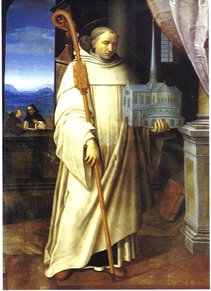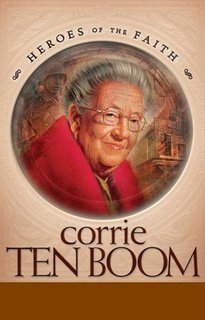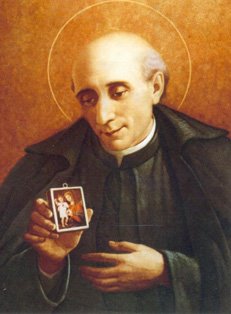
Bernard of Clarivaux was born into the nobility of Burgundy, his father being, Tescelin, Lord of Fontaines and his mother Aleth of Montbard in the year 1090.
From his earliest years, Bernard showed an aptitude for learning he was also deeply devout with a zealousness not usually found in one so young. This young man even from his earliest years showed himself to be a very forceful and charismatic figure who had the ability to draw people to himself and to illuminate the love he held for his Faith to those who would listen to him.
So it was no surprise despite his delicate health that at only 22 years of age he decided to join a Monastery and live the rest of his days as a monk. Due to his charismatic personality 35 other members of his family joined him in his pursuit of the monastic way of life. Quite an achievement for one so young.
One can see even from an early age Bernard was of a determined disposition and did not suffer fools gladly. His rule was so severe that it not only caused him health problems but also his fellow brothers within the Monastery compound. Upon becoming ill, Bernard was able to rest and re-think his strict regime as many of his fellow brothers were flagging under such extreme asceticism and mortifications. When he recovered Bernard relaxed some of the stricter penances for his fellow brothers but he remained very severe with himself.
Bernard was an astute character with a keen intelligence, but this did not mean he was open to any novelty of the moment and remained true to the Teachings of the Catholic Church. He was also very forthright and was not put off by anyone's position in life, not even if that man were the Pope himself! Bernard would speak the truth and accept the consequences for his outspokenness.
This great man of the Church was also not without fault one of them being that Bernard had a great impatience for those who did not grasp facts as quickly and as easily as himself. He also had no patience for those who were indecisive and would often use his quick wit to good effect when dealing with those who were driven by their own ego's rather than a love of God. Bernard also possessed a love for conveying to all his deep passion for God and the Church and would answer all letters written, from the Pope himself to the most humble peasant. In Bernard's mind, all men should be given equal respect be they pauper or prince.
At times the slow moving of the many ecclesial bodies within the Church would set off Bernard's famous impatience, and he would send them his thoughts on various matters. His replies from Rome were equally confronting he was told in no uncertain terms to mind his own business, and keep his thoughts within his own community. It was a robust relationship between those in authority and this most clever and perceptive of men which was the essence of the character of Bernard of Clairvaux.
The very character of Bernard though would be needed by the Catholic Church when an anti-pope Anacletus II tried to overtake the reigning Pope, Innocent II. It was to Bernard that the Church turned to help sort out the mess of the two popes, and who was the legitimate Pontiff. Bernard rallied to Pope Innocent II and helped dispel the cult of Anacletus II by preaching in many different countries as he gained support for the rightful Pope, Innocent II. This would also take a toll on the health of this well spoken and intellectual son of the Church.
During all this work Bernard was also a prodigious writer and his works are still read to this very day. Bernard wrote some of the most mystical writings within the Catholic Church, which gained the respect of all those who read them, his eloquence when writing about different aspects of the Catholic Church would one day make him a Doctor of the Church and deservedly so.
Bernard was also an unwilling accomplice in the Crusades when Rome once again called upon this eloquent monk to preach to the man in the streets in order to set off for the Holy land and the sights sacred to Christianity. Even though many joined the Crusades after listening to Bernard the Crusades were not a success and many lost their lives in the ensuing battles with the Moors, this grieved Bernard deeply. It was at this time that a man tried to bring dissent within the gentile and Jewish communities as he espoused hatred of the Jews. This incensed Bernard, who then immediately rebutted what this despicable man, Raoul and his hateful rantings which incited violence against the Jewish population. Bernard with his usual forthrightness called Raoul exactly what he was a hate filled and heretical speaker who promoted murder at the cost of the innocent. Bernard's condemnation of Raoul was so strong that it gained the respect and admiration of the Jews who lived within the European provinces. So much so that many named their sons after Bernard with the Jewish dialect of Baruch.
All of this traveling and preaching eventually took its toll on the health of Bernard. A man of fierce intellect and a zealous passion for the Church, his entire life was spent in serving the Church which he so loved.
Bernard of Clairvaux died in 1153.
Saint Bernard of Clairvaux was canonized in the year 1170 by Pope Alexander III.
Saint Bernard of Clairvaux was named a Doctor of the Church in 1830 by Pope Pius VIII.
Peace of Christ to ALL
Copyright © 2006 Faith of the Fathers Blogs. All rights reserved.

